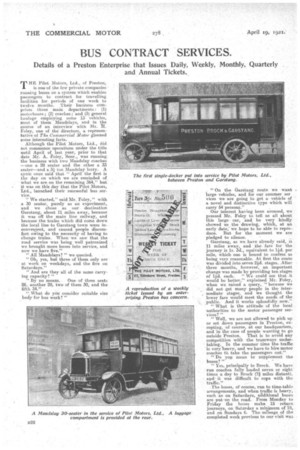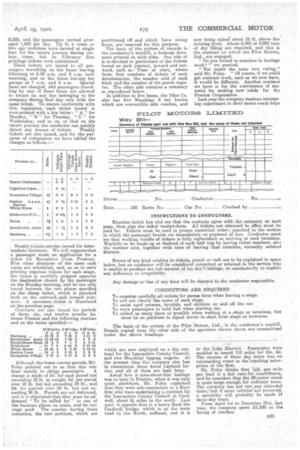BUS CONTRACT SERVICES.
Page 18

Page 19

If you've noticed an error in this article please click here to report it so we can fix it.
Details of a Preston Enterprise that Issues Daily, Weekly, Monthly, Quarterly and Annual Tickets.
THE Pilot Motors, Ltd., of Preston, is one of the few private companies running buses on a system which enables passengers to contract for travelling facilities for periods of ono week to twelve months. Their business comprises threg main departments : (1) motorbuses; (2) coaches; and (3) general haulage employing some 15 vehicles, most of them Maudslays, and in the course of an interview with Mr. II. Foley, one of the directors, a representative of The Commercial Motor gleaned some interesting facts.
Although the Pilot Motors, Ltd., did not commence operations under the title until April of last year, prior to that date Mr. A. Foley, Senr., was running the business with two Maudslay coaches —one a 28 seater and the other a 33 seater—and a 31 ton Maudslay lorry. A cynic once said that "April the first is the day on which we are reminded of what we are on the remaining 364," but it was on this day that the Pilot Motors, Ltd., launched their successful bus service.
" We started," said Mr. Foley," with a 30 seater, purely as an experiment, and we close as our destination Garstang, about 11 miles away, because it was off the main line railway, and because the trains which did come down the local line to Garstang town were inconvenient, and caused people discomfort owing to the necessity of having to change trains. When we saw that the road service was being well patronized we brought more buses into service, and now we have five."
"All Maudslays? " we queried. " Oh, yes, but three of them only are at work on weekdays, and the five on Saturdays."
"And are they all of the same carrying capacity? , " By no means. One: of them seats 26, another 28, two of them 30, and the fifth 34."
". What do you consider suitable size body for bus work? " " On the Grarstang route we want large vehicles, and for our summer ser vices we are going to get a vehicle of a novel and distinctive type which will carry 54 persons." Our interest having been aroused, we pressed Mr. Foley to tell us all about this large car, and he very kindly showed us the drawing, which, at an early date; we hope to be able to reproduce. But for the moment we are pledged to silence. Garstaug, as we have already said, is 11 miles away, and the fare for the journey is is, 3d., equivalent to 11d. per mile, which one is bound to confess as being very reasonable. At first the route was divided into seven 21d. stages. After three months, however, an important change was made by providing ten stages of 11d. each. "We could see that it would be better," explained Mr. Foley, when we raised a query, "because we did not get many people in the intermediate stages, and we thought the lower fare would meet the needs of the .public. And it works splendidly now." " What is the attitude of the local authorities to the motor passenger services? "
"Well, we are not allowed to pick up or set down passengers in Preston excepting, of course, at our headquarters, and in the case of people wanting to go outside Preston. That is to avoid any competition with the tramways undertaking. In the summer thee the traffic is very heavy, and we have to hire motor coaches tO take the passengers out."
"Do you mean to supplement the buses? "
"Yes, principally to Brock. We have run coaches fully loaded seven or eight times a day to Brock (7i miles distant), and it was difficult to cope with the traffic."
The buses, of couise, run to time-table arrangements and when traffic is heavy, such as on E3aturdays, additional buses are put -on the road. From Monday to Friday the buses make 15 return journeys, on Saturday a minimum of 18, and on Sundays 6. The mileage of the completed week previous to our visit was 2,528, and the passengers carried averaged 1,000 ger day. Up to a week or two ago workmen were carried at single fare for the return journey during certain times, but on February 21st privilege tickets were substituted. These tickets are issued to all passengers travelling on the buses leaving Gitrstang at 6.30 a.m. and 8 a.m. each morning, and on the buses leaving the garage at 7 a.m. and 8 a.m. Special fares are charged, ahd passengers travelling by any of these buses are allowed to return on any bus belonging to the company during that day only with the same ticket. To ensure conformity with this regulation, \ each ticket issued is over-printed with a key letter: " A " for Monday, "B " for Tuesday, " C " for Wednesday, and so on, so that on the return journey the conductor can quickly detect any misuse of tickets. Weekly tickets are also issued, and for the purposes of comparison we have tabled the charges as follows:—
Weekly tickets are:also issued for intermediate distances. We will supposetthat a passenger made an application for a ticket for Broughton (from Preston). Five other distances of the same cash value are scheduled, and, so as to save printing separate tickets for each stage, the ticket Is carefully snipped opposite the destination chosen kr the passenger on the Monday morning, and he can only travel between the two places specified on the cheap ticket, which is punched both on the outward„and inward journeys. A specimen ticket is illustrated
on the previous page: Contracts are also issued for periods of three, six, and twelve months between Preston and the following stations and on the terms specified:— Although the buses convey parcels, Mr. Foley pointed out to us that this was done mainly to oblige passengers. A charge is made of 3d. for each parcel not exceeding 10 lb. in weight, 6d., per parcel over 10 lb. but not exceeding 28 lb., and 9d. for parcels over 28 lb. but not exceeding 56 lb. Parcels are not delivered, and it is stipulated that they must be addressed "To be called for " at one of the business places en route, and be carriage paid. The coaches having front entrances, the rear portions, which are partitioned off and which have swing doors, are reserved for this purpose. The basis of the system of records is the conductor's waybill, a foolscap document printed on both sides. One side of it is devoted to particulars of the tickets issued on each journey, inward and outward, such as : Time of start, where from, first numbers of tickets of each denomination, the number sold of each kind, and the number of the punch register. The other side contains a summary as reproduced below. In addition to five buses, the Pilot Co. also has five Rfaudslay 4 ton lorries which are convertible into coaches, and which are now employed on a big contract for the Lancashire County Council, and two Maudslay tipping wagons. At the present time the company also has in commission three hired Leyland lorries, and all of them are kept busy.
Asked how it came about that haulage was so busy in Preston, when it was very quiet elsewhere, Mr. Foley explained that they were sub-contractors to a Bury firm who were undertaking a contract for the Lancashire County Council at Cardwell, about 4& miles to the north. Last year, it appears that in a heavy flood the Cardwell bridge, which is on the main road to the North, suffered, and it is
now being raised" about 10 ft. above the existing level. About 8,000 or 9,000 tons of dry filling are required, and this is the contract on which the Pilot Motors, Ltd., are engaged. " Do you intend to continue in haulage work? " we queried. " Not under the rates now ruling," said Mr. Foley. " Of course, if we could get contract work, such as we now have, It would be different. Another contract we have is for the conveyance of material for making new roads for the Preston Corporation._ Last year the company made an interesting experiment in their motor coach trips to the Lake District. Passengers were enabled to travel 110 miles for 10s. 6d. The success of these day tours was an outstanding event in the coaching enterprises of the firm.
Mr. Foley thinks that 11d. per -mile per load is a fair rate for coachttours, and he considers that the 28-seater coach is quite large enough for ordinary tours. The company has not run ,any extended tours,' but if more vehicles-are procured, a speciality will probably be made "itf three-day tours.
From April 1st to December 31st, last year, the company spent 21,600 on the hiring of coaches.




























